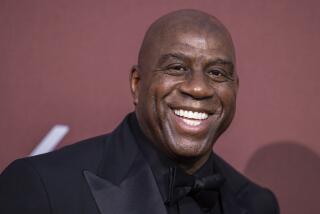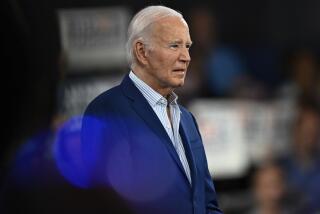When Heroics Mean Survival, Not Escaping Reality : Hero: Magic Johnson has long seemed to defy reality when it came to his playing, but now he gains stature by accepting his fate.
- Share via
NEW YORK — As almost everyone in America realized the moment he stepped up to the microphone to announce he had been infected with AIDS, Magic Johnson’s stature as a hero was enhanced, not diminished, by openly confronting his disease.
“Hero” is a quaint notion in the late 20th Century, an archaic term whose sense we preserve, for the most part, ironically. “Favored by the gods,” the dictionary says; “of more than human strength and ability.” At first glance, hero seems an odd choice of words for someone afflicted with a fatal disease. Yet, if Magic’s fate challenged our sense of what a hero is, his response to that fate expanded it enormously.
The bravery of his announcement tells us something crucial about heroes, and take us back to the roots of heroism--beyond the innocence of childhood games. When he calmly announced, in the white glare of the news cameras, that he had tested positive for HIV, he showed us what it means to be an adult hero, a hero of the real. For heroism does not mean denying fate, but accepting it. Magic has performed a function heroes have fulfilled since the dawn of time: Not to vanquish reality, but rather to grasp it better than ordinary people can. Gently and, as always, with a smile, Magic led us out of a nursery world of imaginary heroes into the heroism of real life.
Heroes have always enjoyed an intermediate status, somewhere between gods and men. Since before Homer, heroes mediated the needs and foibles of mere mortals, on one hand, and the laws of an inscrutable nature or fate, on the other. They pull this off because they have an abundance of what medieval German tribes called “heil.” Related etymologically to hail and health, heil referred to a special kind of good fortune you had to have to be a tribal hero or king. Heil was the hero’s special capacity to subdue accidents and master chance.
It’s here that heroes have historically surpassed the general run of mortal life. They have a better grasp of the way contingencies--the unplanned for, the accidental--impinge on human affairs. Able, as if by magic, to enjoin happy outcomes upon reality, heroes win games, defeat monsters, cheat death. For this reason, they are appointed the tribe’s indispensable takers of calculated risks, because somehow they are capable of operating at the limits of the culture’s norms of ability and awareness.
We still have heroes, of course, and we still hail the conquering ones. In our own day, we recognize heil most readily in our great athletes. We applaud the edge of successful recklessness a Magic Johnson or a John McEnroe or a Roger Clemens can achieve at the peak of their form: Unbeatable figures moving with an abrupt, elegant awkwardness. You can’t really tell whether a Magic or a McEnroe is graceful or ungainly. They are somehow both, for at that level of ability, prowess is manifest in the angled, off-beat mastery of unforeseen contingencies, not in practiced execution of well-rehearsed shots. Magic himself rose to the fast-breaking demands of the game with a fleet ingenuity that came from faculties preternaturally attuned to that vanishing point, invisible to mere mortals, where the concrete circumstances of the game--ball, floor, boundary, hoop--intersected the chance emergencies of the moment.
This is what made Johnson an athletic hero, not just a gifted performer. On court, he seemed effortlessly to grasp the intricate realities of his game, bending accident to his will.
Just as the heroes of old were poised between gods and mortals, so our greatest hero-athletes seem poised between the illusory and the real, between wish and actuality, between the dreams of childhood and the hard facts of the adult.
In our time, however, our hero-athletes have tended almost exclusively to represent the child in us. Our sports heroes pander to our most primal dreams of easy triumph and lavish success--faster than light, lighter than air, above mere facts. Our great hero-athletes allow us to dream, for a instant, that we might be superior to reality, that we might, like Air Jordan, defy gravity, overcome time. We especially revere those conquering few who, at the top of their game, seem masters of their fates, because they allow us to believe, for a moment, that we might be masters of ours.
Magic seemed to be the greatest master of them all--but then disaster stepped in. Off court, he is now facing the ultimate unmastered contingency, and he has chosen to face it in front of us--and for us. What we recognize in the bravery of his announcement is that our delight in his on-court heroics always betrayed the shadow of our own childish narcissism. We could triumph because he did. He was the bearer of our infant hope that we, like him, could overcome the odds. Through him, as through our other great athlete-heroes, we would abolish hazard, and reign supreme.
Now, Magic’s heil, his good fortune and his health, have failed him. And yet, he has managed, almost impossibly, to raise his game yet again--and, in the process, has shown us what true heroism is.
For Magic’s announcement showed adult heroism--he did it for us, not for himself. We will not triumph vicariously through his triumph this time. By openly embracing the truth of his disease, he may help lead us out of the dangerous denial of vulnerability our insistence on imaginary heroics has too long maintained. His simple courage in coming forth reminds us that heroism in its highest form is not about individuals triumphing, as we think in childhood. It is about embracing reality, not abolishing it. It is about communities enduring, about collective survival, which as adults we must come to learn.
On court, Magic was the hero of our childhood dreams because he seemed able to laughingly deny the mortal coil. Now, off court, the mortal coil is upon him--and he has shown a greater heroism by submitting so openly, so courageously to the reality of his plight. Once he was the hero of the imaginary--where we all live forever and triumph. Now he is the hero of the real, where we must care for each other to survive.
More to Read
The biggest entertainment stories
Get our big stories about Hollywood, film, television, music, arts, culture and more right in your inbox as soon as they publish.
You may occasionally receive promotional content from the Los Angeles Times.










